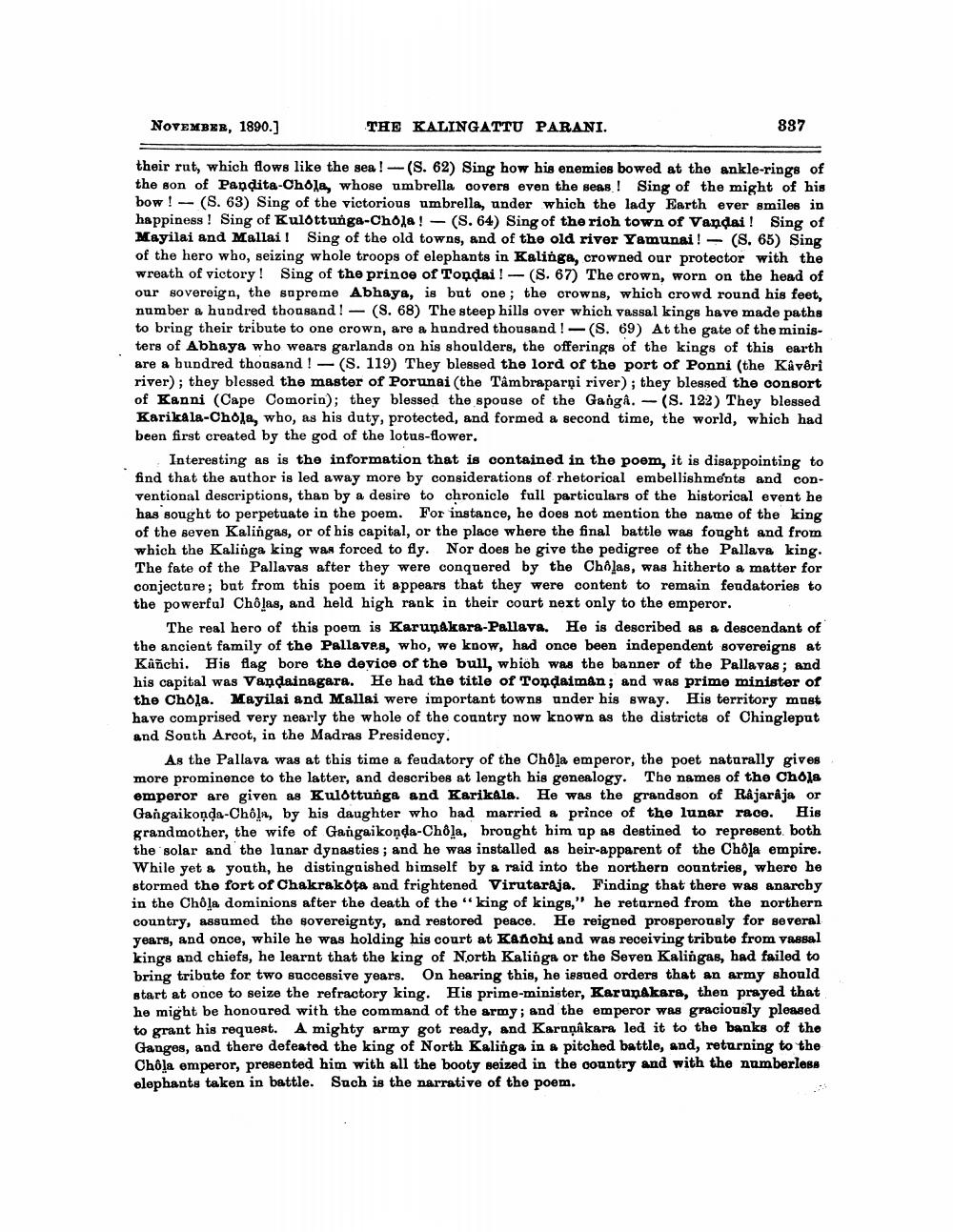________________
NOVEMBER, 1890.)
THE KALINGATTU PARANI.
887
their rut, which flows like the sea!-(S. 62) Sing how his enemies bowed at the ankle-rings of the son of Pandita-Chola, whose umbrella covers even the seas! Sing of the might of his bow ! - (S. 63) Sing of the victorious umbrella, under which the lady Earth ever smiles in happiness! Sing of Kulottunga-Chola ! - (S. 64) Sing of the rich town of Vandai! Sing of Mayilai and Mallai! Sing of the old towns, and of the old river Yamunai! - (S. 65) Sing of the hero who, seizing whole troops of elephants in Kalinga, crowned our protector with the wreath of victory! Sing of the prince of Tondai! - (S. 67) The crown, worn on the head of our sovereign, the supreme Abhaya, is but one; the crowns, which crowd round his feet, number a hundred thousand! - (S. 68) The steep hills over which vassal kings have made paths to bring their tribute to one crown, are a hundred thousand !-(S. 69) At the gate of the ministers of Abhaya who wears garlands on his shoulders, the offerings of the kings of this earth are a bundred thousand ! — (S. 119) They blessed the lord of the port of Ponni (the Kávéri river); they blessed the master of Porunai (the Tâmbraparņi river); they blessed the consort of Kanni (Cape Comorin); they blessed the spouse of the GangÂ. - (S. 122) They blessed Karikala-Chola, who, as his duty, protected, and formed a second time, the world, which had been first created by the god of the lotus-flower.
Interesting as is the information that is contained in the poem, it is disappointing to find that the author is led away more by considerations of rhetorical embellishments and conventional descriptions, than by a desire to chronicle full particulars of the historical event he has sought to perpetuate in the poem. For instance, he does not mention the name of the king of the seven Kalingas, or of his capital, or the place where the final battle was fought and from which the Kalinga king was forced to fly. Nor does he give the pedigree of the Pallava king. The fate of the Pallavas after they were conquered by the Chôlas, was hitherto a matter for conjectare; but from this poem it appears that they were content to remain feudatories to the powerful Chôlas, and held high rank in their court next only to the emperor.
The real hero of this poem is Karunakara-Pallava. He is described as a descendant of the ancient family of the Pallaves, who, we know, had once been independent sovereigns at Kanchi. His flag bore the device of the bull, which was the banner of the Pallavas; and his capital was Vandainagara. He had the title of Tondaimán; and was prime minister of the Chola. Mayilai and Mallai were important towns under his sway. His territory must have comprised very nearly the whole of the country now known as the districts of Chingleput and South Arcot, in the Madras Presidency.
As the Pallava was at this time a feudatory of the Chola emperor, the poet naturally gives more prominence to the latter, and describes at length his genealogy. The names of the Chola emperor are given as Kulottunga and Karikala. He was the grandson of Rajaraja or Gangaikonda-Chöln, by his daughter who had married a prince of the lunar race. His grandmother, the wife of Gangaikoņça-Chola, brought him up as destined to represent both the solar and the lanar dynasties; and he was installed as heir-apparent of the Chola empire. While yet & youth, he distingaished bimself by a raid into the northern countries, where he stormed the fort of Chakrakota and frightened Virutaraja. Finding that there was anarchy in the Chola dominions after the death of the king of kings," he retarned from the northern country, assumed the sovereignty, and restored peace. He reigned prosperously for several years, and once, while he was holding his court at Kanchi and was receiving tribute from vassal kings and chiefs, he learnt that the king of North Kalinga or the Seven Kalingas, had failed to bring tribute for two successive years. On hearing this, he issued orders that an army should start at once to seize the refractory king. His prime-minister, Karunakara, then prayed that he might be honoured with the command of the army; and the emperor was graciously pleased to grant his request. A mighty army got ready, and Karuņakara led it to the banks of the Ganges, and there defeated the king of North Kalinga in a pitched battle, and, returning to the Chola emperor, presented him with all the booty seized in the country and with the numberless elephants taken in battle. Such is the narrative of the poem.




